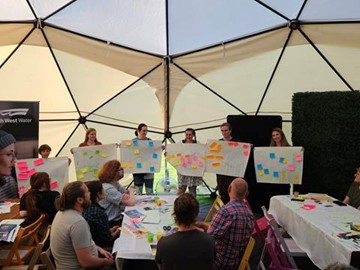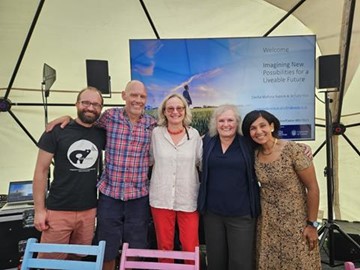Climate Communication Delivers Hope at The British Science Festival
By Dr Sally Flint
People find it inspiring to have dedicated time and space to write and explore together ‘Creative Climate Communication’ and ‘Imagining New Possibilities for a Liveable Future’. That was feedback to experts from the University of Exeter who provided two innovative forums at the British Science Festival during the 7-10 September for crowds to experiment with climate conversations, language, images, and poetry – and imagine what a greener, healthier, fairer world looks like, and how positive actions can make that happen.
Both events were grounded on a methodology which has grown out of successful projects taken to the climate change conferences COP26 (UK) and COP27 (Egypt), where a team of scientists, health professionals, educators, youth leaders, translators, and artists joined together to create new climate narratives underpinned by cutting edge research to show how climate change is affecting our world. The interdisciplinary team’s aims continue to grow. Cecilia Mañosa Nyblon, Director of the COP 26, 27, and 28 projects explains: ‘Together our team have developed a blueprint for connecting facts, findings, and feelings, co-creating new narratives underpinned by world-class science. These narratives are then brought to life through the arts to embolden us to imagine and take action to forge a liveable future. For COP28 in Dubai we are undertaking a bigger, bolder project to include poetry, music, sustainable theatre performances, sustainable theatre network and an educational toolkit.’ (The collaborative outputs One Chance Left (12 Poems for 12 days of COP26) and We Still Have a Chance (12 Stories for 12 days of COP 27) are free to read and listen to on the University of Exeter’s Green Futures website.)
Creative lead and editor of the above projects, Dr Sally Flint, realises: ‘As we head towards negotiations at COP28 it’s a helpful shift to see words such as ‘adaptation’ and ‘regeneration’ rising to the surface to show there are climate solutions that can be activated now, and there are more to be found. To have this opportunity at the British Science Festival for people from all walks of life and all ages to share their climate stories, concerns, and hopes for the future strengthens our team’s belief that connecting global and local narratives accelerates positive climate actions.’
Professor Hugh Roberts said: ‘Creative Climate Communication’ revealed the multilingual atmosphere of a Friday night in a shopping centre in Exeter, as visitors to our stall created a storm of climate words in Greek, Cantonese, Spanish, Italian, Estonian, Malay, Finnish, Swedish, Galician, French, Dutch, as well as dialect terms from Scotland and Yorkshire. Such a range of languages is in a way its own ecosystem, with each word rooted in a place, yet reaching out to global concerns.’
Dr Eliana Maestri talked with contributors about how some climate words cannot easily be translated into other languages such as ‘Bog’ and ‘Mist’; that dialect is influenced by what’s happening in specific environments. Professor Rosa Barciela, representing the Met Office, demonstrated a ‘storm in a bottle’ which proved to be a showstopper, and offered opportunities to discuss the physics of why tornados are occurring more frequently. Focussing on local environments aided the writing. A young volunteer who helps with cleaning up the banks of the River Exe said, ‘It was great to have time to pause and write about what we do and why.’ A GP explained how climate anxiety is affecting patients’ wellbeing – therefore opportunities to share environmental hopefulness is also beneficial to wellbeing.

The festival’s two-hour closing event workshop Imagining New Possibilities for a Liveable Future’ was a resounding success. Designed and led by Cecilia Mañosa Nyblon with Dr Sally Flint, were joined by over 50 people immersed in soundscapes, creative writing, digital visualisations, Imagine My App developed by Dom Jinks and Exeter City Council and songs in a marquee on Cathedral Green. By focussing on Exeter’s future as a sustainable city the COP team’s Professor Ian Fussell, Dr Fatma Sabet from the university and Dr Jono Gilmurray (BIMM Institute) and Chris from Exeter City Council, provided their expertise to forge discussions about positive climate initiatives happening in Exeter. Everyone joined in collaging a table-top outline of the River Exe with what we would like to see happen to ensure Exeter develops a sustainable, thriving environment.

Huge thanks to the British Science Festival for providing space to demystify how environmental changes and solutions can be imagined, created, enacted, and managed for the benefit of everyone. The team going to COP28 will be driven by the feedback form these sessions. The final comments of people leaving ‘Imagining New Possibilities for a Liveable Future’ were: ‘Thank you for letting us see that together, creating a better, more sustainable world can happen, and is in our reach.’ The last word added by a student to ‘creating a storm’ was ‘HOPE’.
